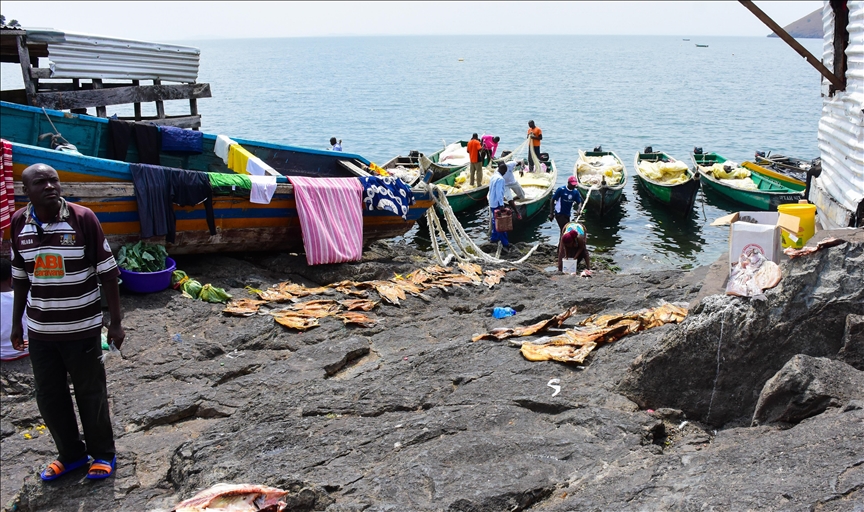Pollution killing Africa’s largest freshwater lake
Human activity including shoreline encroachment, degradation depleting vital flora, fauna on Lake Victoria
 File Photo
File Photo
KAMPALA, Uganda
The Ruparelia Group, a privately owned company belonging to Sudhir Ruparelia, acquired a permit to construct a resort and convention Centre on Lake Victoria shores in Uganda.
The project is estimated to cost $100 million.
A video recorded by angry residents showing trucks dumping soil into the lake went viral on social media, raising concerns of lakeshore degradation from soil siltation where fish lay their eggs.
The National Environmental Management Authority, the agency responsible for supervising environmental activities, said the company owned by the richest man in Uganda of Indian origin was dumping soil into the lake in breach of conditions of the Environment and Social Impact Assessment Certificate that was issued to the Ruparelia Group to guide the development project.
Ruparelia Group denied dumping soil in the lake and said the only breach was using the lake shores without a permit.
It is not the first time that Ruparelia is being accused of degrading Lake Victoria shores.
In 2013, residents petitioned parliament, accusing Ruparelia of expanding Rosebud Flower Farm Ltd by dumping soil onto more than 200 acres (81 hectares) in a wetland off the shores of Lake Victoria.
Kawuma Mohammed, a former MP for the Entebbe municipality, told Anadolu Agency that soil dumping affects the existence of fish and other aquatic life in the lake.
“Recently, we witnessed piles of dead fish washing up on the shores of Lake Victoria in Uganda and Kenya and this was attributed to contamination of the lake,” he said. “Millions of people in Uganda, Kenya and Tanzania who depend on Lake Victoria for their livelihood were negatively affected because they could no longer catch fish to sell. It is actions like the one of the Ruparelia Group that contaminate the lake!”
Fish exports
Fish is one of the top exports from East African countries. Data from the Uganda Bureau of Statistics indicates that the country annually exports an average of 14,976 tons of fish and fish products.
In 2021, fish earned the country $11.4 million, according to data from the Bank of Uganda Commodity Performance report. The largest exports remain coffee, cotton, tea and tobacco.
Ovia Katiti Matovu, chief executive officer of Uganda Fish Processors and Exporters Association, said it was important to safeguard the fishing industry for economic development and employment for the increased populace whose demand for nutrition and food security is increasing.
Lake Victoria is the second-largest freshwater lake in the world only exceeded in size by Lake Superior in the US.
A recent study examining the lake's water quality and degradation by researchers from Texas Southern University in the US and Uganda’s Makerere University revealed that Lake Victoria has been heavily polluted with high traces of three dangerous minerals -- lead, arsenic aluminum and phosphorus -- which are not good for humans to consume in certain quantities.
Fishermen on Lake Victoria at the Kiyindi landing site in eastern Uganda ditched their boats because they are catching fewer fish and the price of fuel is higher.
“The fisheries protection unit does not allow us to fish near the shores of the lake and because fuel is very scarce these days, we cannot go far into the lake because there is no guarantee that we shall catch fish,” fisherman Jibril Ssebadduka told Anadolu Agency.
Lake Victoria Catch Assessment Survey-2015 conducted by the Kenya Marine and Fisheries Research Institute confirmed that Africa’s largest freshwater lake is running out of fish, its biggest economic resource.
Total fish caught dropped from 1.1 billion metric tons in 2014 to 795.8 million metric tons in 2015. The survey attributed the drop to normal seasonal variations, demand and supply.
“Because of the continued human activities including shoreline encroachment and degradation of the lake, there has been depletion of vital flora and fauna,” Katongole Hadija, an environmental lecturer at Kampala International University, told Anadolu Agency.
“There is a need for restoration and conservation for proper watershed management to ensure improved water quality and prevent continuing loss and degradation of the lakeshore,” he added.
Anadolu Agency website contains only a portion of the news stories offered to subscribers in the AA News Broadcasting System (HAS), and in summarized form. Please contact us for subscription options.

